Title Page
Copyright Page
Dedication
About the Authors
Acknowledgments
Table of Contents
List of Gotchas
Foreword by Steve Golson
Chapter 1 Introduction, What Is A Gotcha?
What are Verilog and System Verilog?
What is a Gotcha?
The Verilog and System Verilog standards
Chapter 2 Declaration and Literal Number Gotchas
Gotcha 1: Case sensitivity
Gotcha 2: Implicit net declarations
Gotcba 3: Default of 1-bit internal nets
Gotcha 4: Single file versus multi-file compilation of $unit declarations
Gotcha 5: Local variable declarations
Gotcha 6: Escaped names in hierarchical paths
Gotcha 7: Hierarchical references to automatic variables
Gotcha 8: Hierarchical references to variables in unnamed blocks
Gotcha 9: Hierarchical references to imported package items
Gotcha 10: Importing enumerated types from packages
Gotcha 11: Importing from multiple packages
Gotcha 12: Default base of literal integers
Gotcha 13: Signedness of literal integers
Gotcha 14: Signed literal integers zero extend to their specified size
Gotcha 15: Literal integersize mismatch in assignments
Gotcha 16: Filling vectors with all ones
Gotcha 17: Array literals versus concatenations
Gotcha 18: Port connection rules
Gotcha 19: Back-driven ports
Gotcha 20: Passing real (floating point) numbers through ports
Chapter 3 RTL Modeling Gotchas
Gotcha 21: Combinational logic sensitivity lists with function calls
Gotcha 22: Arrays in sensitivity lists
Gotcha 23: Vectors in sequential logic sensitivity lists
Gotcha 24: Operations in sensitivity lists
Gotcha 25: Sequential logic blocks with begin...end groups
Gotcha 26: Sequential logic blocks with resets
Gotcha 27: Asynchronous set/reset flip-flop for simulation and synthesis
Gotcha 28: Blocking assignments in sequential procedural blocks
Gotcha 29: Sequential logic that requires blocking assignments
Gotcha 30: Nonblocking assignments in combinational logic
Gotcha 31: Combinational logic assignments in the wrong order
Gotcha 32: Casez/casex masks in case expressions
Gotcha 33: Incomplete decision statements
Gotcha 34: Overlapped decision statements
Gotcha 35: Inappropriate use of unique case statements
Gotcha 36: Resetting 2-state models
Gotcha 37: Locked state machines modeled with enumerated types
Gotcha 38: Hidden design problems with 4-state logic
Gotcha 39: Hidden design problems using 2-state types
Gotcha 40: Hidden problems with out-or-bounds array access
Gotcha 41: Out-or-bounds assignments to enumerated types
Gotcha 42: Undetected shared variables in modules
Gotcha 43: Undetected shared variables in interfaces and packages
Chapter 4 Operator Gotchas
Gotcha 44: Assignments in expressions
Gotcha 45: Self-determined versus context-determined operators
Gotcha 46: Operation size and sign extension in assignment statements
Gotcha 47: Signed arithmetic rules
Gotcha 48: Bit-select and part-select operations
Gotcha 49: Increment, decrement and assignment operators
Gotcha 50: Pre-increment versus post-increment operations
Gotcha 51: Modifying a variable multiple times in onestatement
Gotcha 52: Operator evaluation short circuiting
Gotcha 53: The not operator ( ! ) versus the invert operator ( ~ )
Gotcha 54: Array method operations
Gotcha 55: Array method operations on an array subset
Chapter 5 General Programming Gotchas
Gotcha 56: Verifying asynchronous and synchronous reset at time zero
Gotcha 57: Nested if ...else blocks
Gotcha 58: Evaluation of equality with 4-state values
Gotcha 59: Event trigger race conditions
Gotcha 60: Using semaphores for synchronization
Gotcha 61: Using mailboxes for synchronization
Gotcha 62: Triggering on clocking blocks
Gotcha 63: Misplaced semicolons after decision statements
Gotcha 64: Misplaced semicolons in for loops
Gotcha 65: Infinite for loops
Gotcha 66: Locked simulation due to concurrent for loops
Gotcha 67: Referencing for loop control variables
Gotcha 68: Default function return size
Gotcha 69: Task/function arguments with default values
Gotcha 70: Continuous assignments with delays cancel glitches
Chapter 6 Object Oriented and Multi-Threaded Programming Gotchas
Gotcha 71: Programming statements in a class
Gotcha 72: Using interfaces with object-oriented testbenches
Gotcha 73: All objects in mailbox come out with the same values
Gotcha 74: Passing handles to methods using input versus ref arguments
Gotcha 75: Constructing an array of objects
Gotcha 76: Static tasks and functions are not re-entrant
Gotcha 77: Static versus automatic variable initialization
Gotcha 78: Forked programming threads need automatic variables
Gotcha 79: Disable fork kills too many threads
Gotcha 80: Disabling a statement block stops more than intended
Gotcha 81: Simulation exits prematurely, before tests complete
Chapter 7 Randomization, Coverage and Assertion Gotchas
Gotcha 82: Variables declared with rand are not getting randomized
Gotcha 83: Undetected randomization failures
Gotcha 84: $assertoff could disable randomization
Gotcha 85: Boolean constraints on more than two random variables
Gotcha 86: Unwanted negative values in random values
Gotcha 87: Coverage reports default to groups, not bins
Gotcha 88: Coverage is always reported as 0%
Gotcha 89: The coverage report lumps all instances together
Gotcha 90: Covergroup argument directions are sticky
Gotcha 91: Assertion pass statements execute with a vacuous success
Gotcha 92: Concurrent assertions in procedural blocks
Gotcha 93: Mismatch in assert...else statements
Gotcha 94: Assertions that cannot fail
Chapter 8 Tool Compatibility Gotchas
Gotcha 95: Default simulation time units and precision
Gotcha 96: Package chaining
Gotcha 97: Random number generator is not consistent across tools
Gotcha 98: Loading memories modeled with aIways_latch/always_ff
Gotcha 99: Non-standard language extensions
Gotcha 100: Array literals versus concatenations
Gotcha 101: Module ports that pass floating point values (real types)
Index
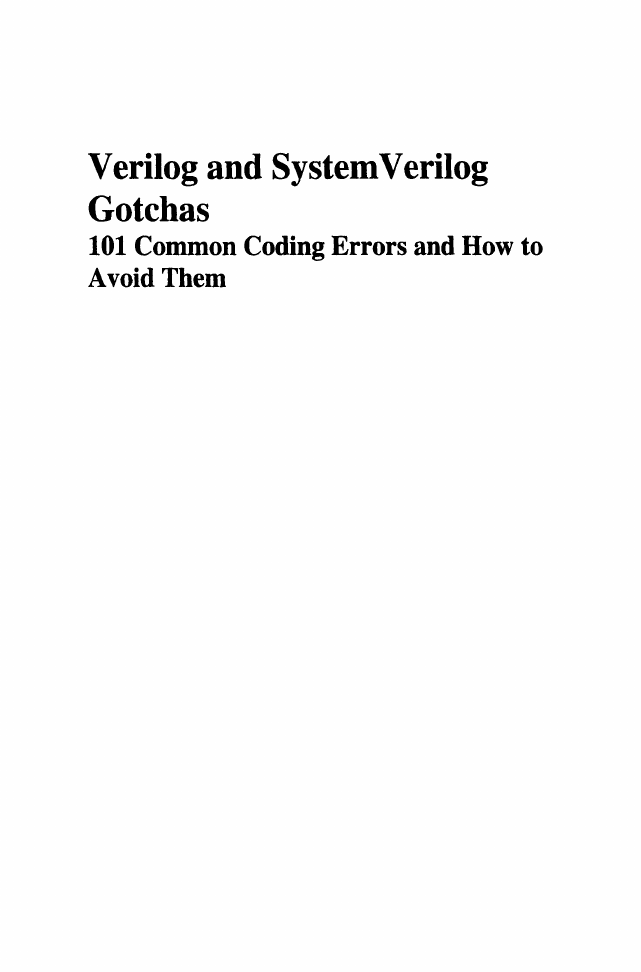
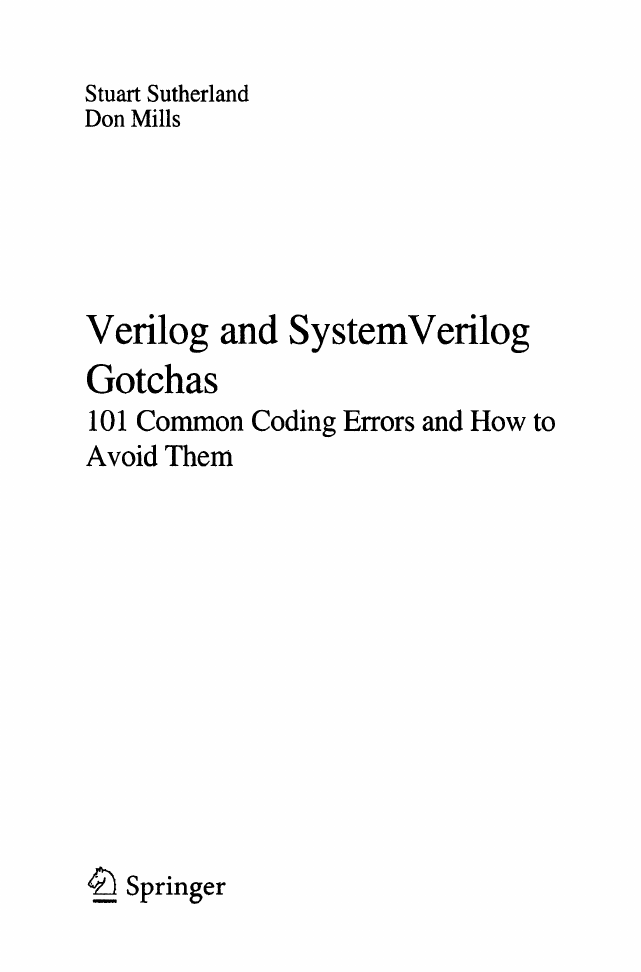
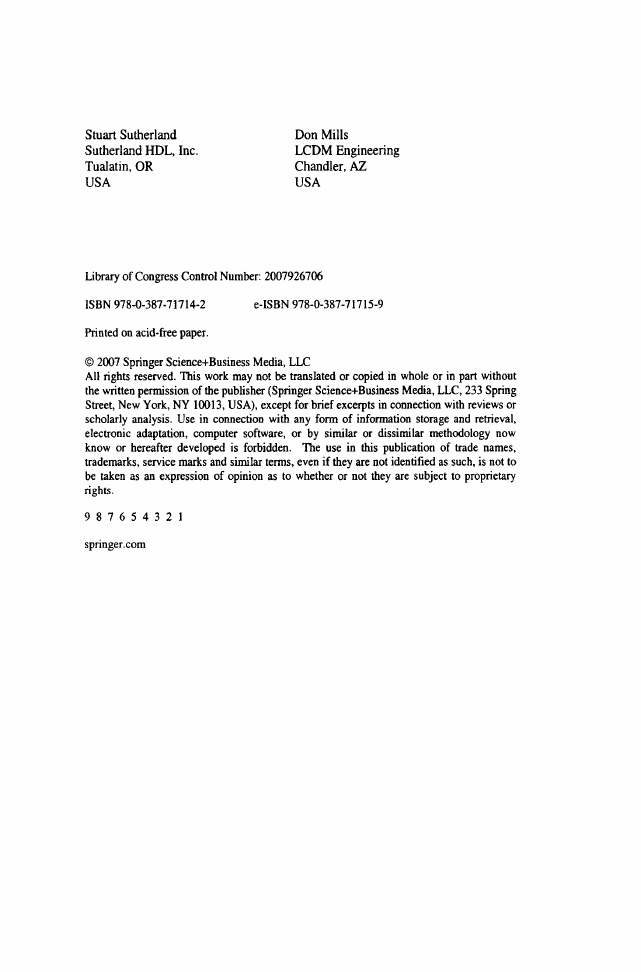
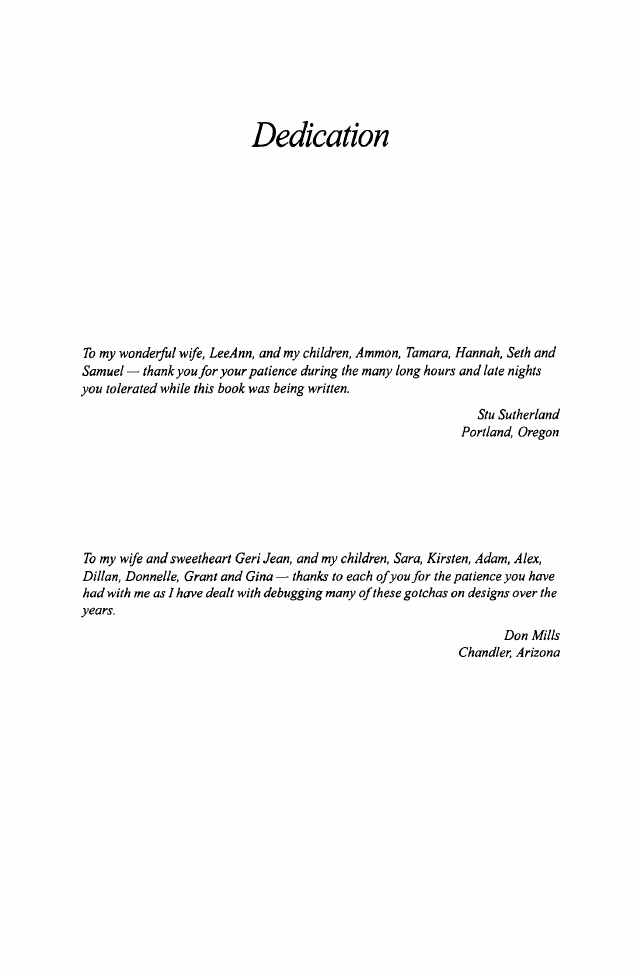
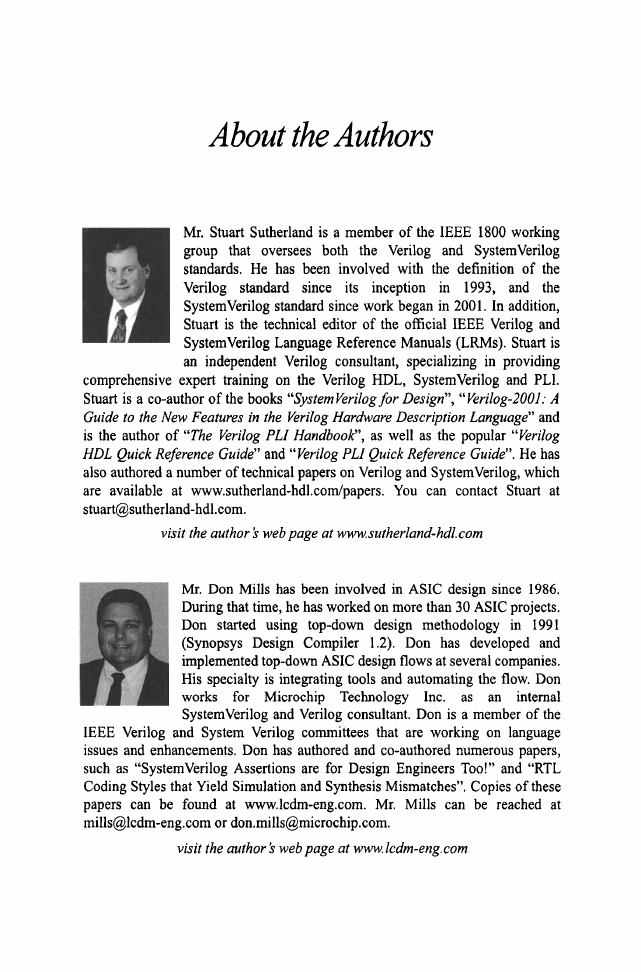

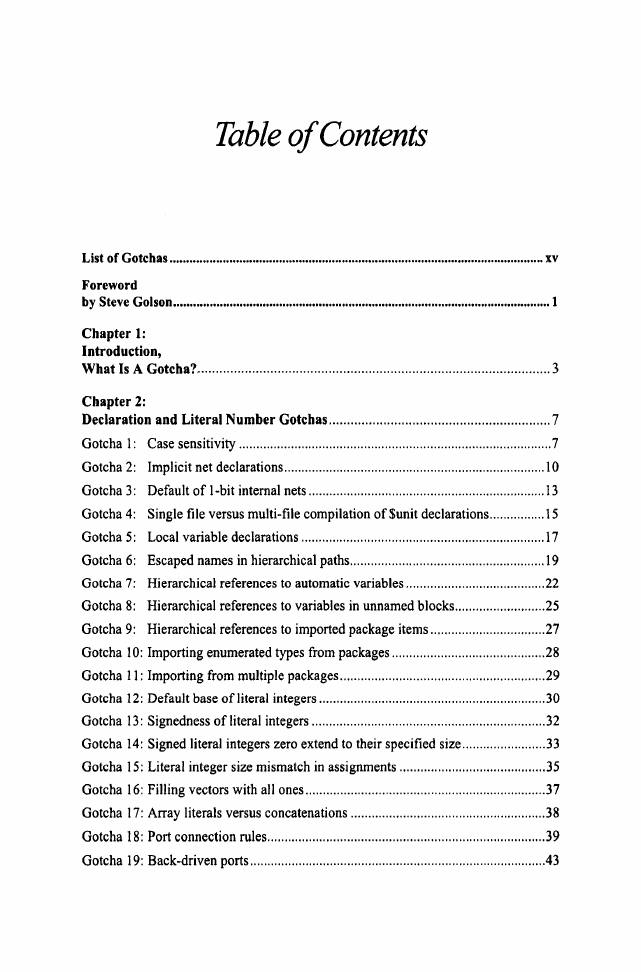
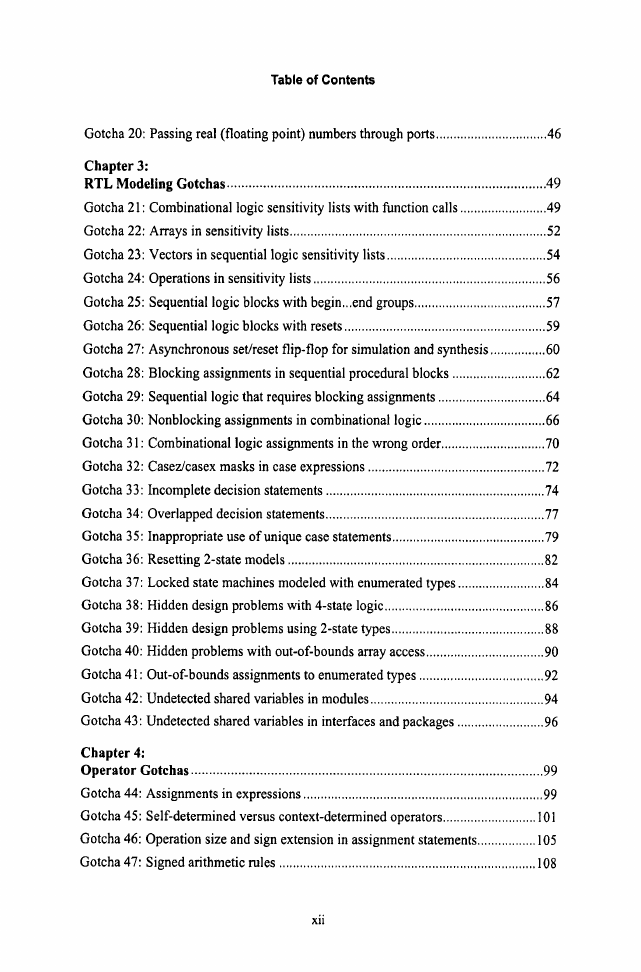








 2023年江西萍乡中考道德与法治真题及答案.doc
2023年江西萍乡中考道德与法治真题及答案.doc 2012年重庆南川中考生物真题及答案.doc
2012年重庆南川中考生物真题及答案.doc 2013年江西师范大学地理学综合及文艺理论基础考研真题.doc
2013年江西师范大学地理学综合及文艺理论基础考研真题.doc 2020年四川甘孜小升初语文真题及答案I卷.doc
2020年四川甘孜小升初语文真题及答案I卷.doc 2020年注册岩土工程师专业基础考试真题及答案.doc
2020年注册岩土工程师专业基础考试真题及答案.doc 2023-2024学年福建省厦门市九年级上学期数学月考试题及答案.doc
2023-2024学年福建省厦门市九年级上学期数学月考试题及答案.doc 2021-2022学年辽宁省沈阳市大东区九年级上学期语文期末试题及答案.doc
2021-2022学年辽宁省沈阳市大东区九年级上学期语文期末试题及答案.doc 2022-2023学年北京东城区初三第一学期物理期末试卷及答案.doc
2022-2023学年北京东城区初三第一学期物理期末试卷及答案.doc 2018上半年江西教师资格初中地理学科知识与教学能力真题及答案.doc
2018上半年江西教师资格初中地理学科知识与教学能力真题及答案.doc 2012年河北国家公务员申论考试真题及答案-省级.doc
2012年河北国家公务员申论考试真题及答案-省级.doc 2020-2021学年江苏省扬州市江都区邵樊片九年级上学期数学第一次质量检测试题及答案.doc
2020-2021学年江苏省扬州市江都区邵樊片九年级上学期数学第一次质量检测试题及答案.doc 2022下半年黑龙江教师资格证中学综合素质真题及答案.doc
2022下半年黑龙江教师资格证中学综合素质真题及答案.doc